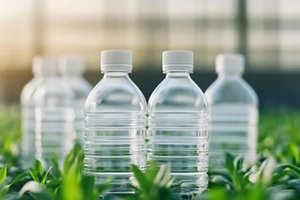April 10, 2025

As the concerns regarding microplastics, tiny fragments released as plastics degrade, continue to raise concern for aquatic life and the balance of nature, new, innovative solutions are rapidly developing. A promising alternative has emerged in the form of plant-based plastic materials, which release significantly fewer microplastics compared to their petroleum-based counterparts.
Recent research sheds light on how these innovative materials behave under harsh conditions, offering valuable insights for industries aiming to reduce their environmental impact. The findings open the door to reimagining how we approach sustainability in plastics, blending science with actionable strategies to protect our oceans.
Recent research reveals a promising advantage of bio-based plastics over conventional plastic materials in mitigating microplastic pollution. Polylactic acid, or PLA, a plastic derived from renewable feedstocks, releases nine times fewer microplastics than polypropylene, a widely used petroleum-based plastic.
These findings emerged from a study simulating extreme conditions, exposing the plastic materials to intense UV light and seawater for 76 days, which is the equivalent to two years of sunlight exposure in central Europe.
The study highlights an important reality: while bio-based plastics significantly reduce microplastic release, the issue persists even with these alternatives. Understanding how these plastic materials degrade under environmental stressors is important for understanding how they may affect marine ecosystems.
Led by the University of Portsmouth and the Flanders Marine Institute, this collaborative research was conducted under the SeaBioComp project, supported by the Interreg 2 Seas Programme with funding from the European Regional Development Fund.
Plant-based plastics provide a meaningful step toward reducing microplastic pollution in marine environments. Unlike petroleum-based plastics, PLA releases significantly fewer microplastics as it degrades, making it a more sustainable choice for applications that may expose materials to harsh conditions.
Derived from renewable natural feedstocks, bio-based plastics offer an additional advantage: they decrease reliance on finite petroleum resources. By aligning with global sustainability goals, PLA and similar materials present an opportunity to mitigate oceanic pollution. These innovations pave the way for a future where durable, functional plastics can coexist with efforts to preserve marine ecosystems.

While bio-based plastics like PLA offer significant improvements, the release of microplastics during degradation remains an environmental concern. Even with reduced volumes compared to conventional plastics, microplastics from plant-based materials still contribute to ocean pollution.
Studies have also revealed differences in the size and shape of particles released. PLA tends to produce larger, fiber-like fragments, whereas polypropylene generates smaller, more uniform pieces. These variations could have distinct impacts on marine life, influencing how microplastics interact with ecosystems.
Advancing plant-based plastics requires further innovation to address these important, pressing challenges. Reducing microplastic release while maintaining plastic material performance is a key priority for creating sustainable options with minimal environmental trade-offs. The path forward calls for collaboration across industries and research institutions.
With continued research and understanding, bio-based plastics like PLA present exciting possibilities for marine applications where durability and sustainability converge. These materials could play a vital role in constructing boat hulls, ocean equipment, and other marine infrastructure. Their reduced microplastic release makes them an appealing option for industries aiming to minimize environmental harm while maintaining performance.
Collaboration with researchers is essential to refine these plastic materials further. Initiatives such as the SeaBioComp project provide valuable insights into the behavior of bio-based plastics under environmental stressors, guiding improvements in design and functionality.
The study’s findings position plant-based plastics as a promising solution for industries seeking to enhance their environmental responsibility. As demand for sustainable alternatives grows, bio-based plastics are emerging as a practical and impactful choice for reducing the ecological footprint of marine operations.
Join our PLASTICS Pulse newsletter today to receive updates on within the plastic industry while staying informed & connected.
Industry leaders have a significant role to play in advancing the adoption of bio-based plastics among relevant parties. Investing in research and development can unlock improvements in performance, scalability, and environmental benefits, making these materials more viable for widespread use. Prioritizing such initiatives helps position companies as pioneers in sustainable innovation.

Proactive measures, like adopting advanced recycling technologies and integrating eco-design principles, can further mitigate the environmental impact of plastics. Leadership in sustainability also involves championing policies and partnerships that drive meaningful change. Supporting collaborations with initiatives such as Revolution Plastics and aligning with evolving regulatory frameworks allow businesses to balance environmental responsibility with profitability.
Simply put, the path forward requires bold decisions that place sustainability at the core of industry progress.
Bio-based plastics offer a promising path toward reducing microplastic pollution and advancing sustainability in marine environments. While certain challenges remain, collaboration, research, and innovation can drive meaningful progress. With this in mind, industry professionals across the board are encouraged to join PLASTICS, the Plastics Industry Association, for important insights on emerging technologies and access to exclusive membership opportunities and resources.
PLASTICS and the Future Leaders in Plastics (FLiP) Committee are devoted to supporting and encouraging the next generation of plastics leaders who will play a crucial role in the innovation, technology and future of the plastics industry. FLiP’s mission is to provide young professionals under the age of 40 the exposure, education and resources they need to build lifelong careers in plastics. Want to join? Want to get your employees involved? Email: [email protected]